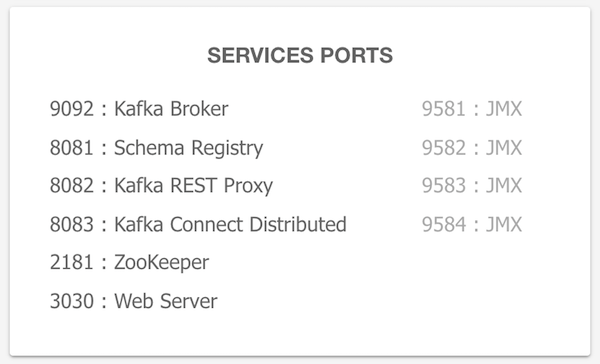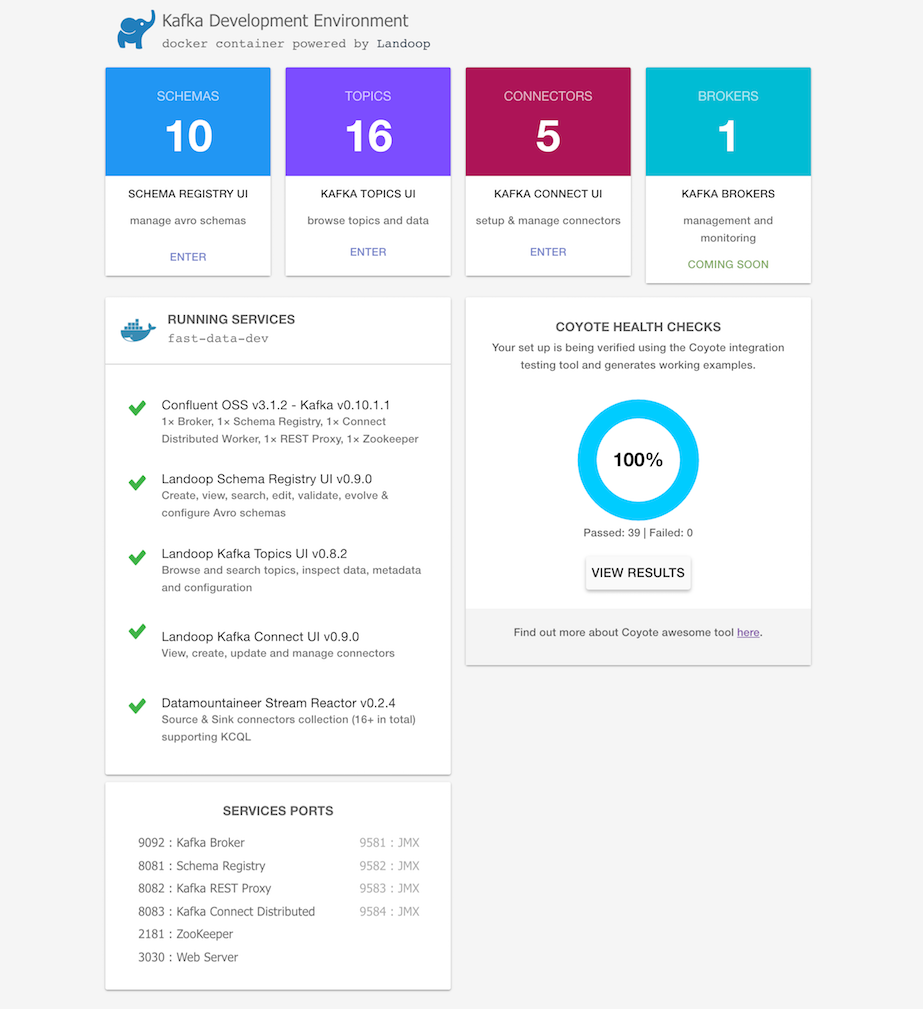-
Notifications
You must be signed in to change notification settings - Fork 329
Home
Kafka docker image with Confluent (OSS), Landoop tools, 20+ Kafka Connectors
View latest demo on-line
When you need:
- Confluent Open Source distribution of Apache Kafka including: ZooKeeper, Schema Registry, Kafka REST, Kafka-Connect
- Landoop Fast Data Tools including: kafka-topics-ui, schema-registry-ui, kafka-connect-ui
- 20+ Kafka Connectors to simplify ETL processes
- Integration testing and examples embedded into the docker
just run:
docker run --rm -it --net=host landoop/fast-data-dev
That's it. Visit http://localhost:3030 to get into the fast-data-dev environment

Your Broker is at localhost:9092, your Kafka REST Proxy at localhost:8082, your Schema Registry at localhost:8081, your Connect Distributed at localhost:8083, your ZooKeeper at localhost:2181.
If you want to have it remotely accessible, then you need to pass in your machine's IP address or hostname that other machines can use to access it:
docker run --rm -it --net=host -e ADV_HOST=<IP> landoop/fast-data-dev
Hit control+c to stop and remove everything

On Mac OS X allocate at least 6GB RAM to the VM:
docker-machine create --driver virtualbox --virtualbox-cpu-count "4" --virtualbox-memory "6024" devel
eval $(docker-machine env devel)
And define ports and advertise hostname:
docker run --rm -it -p 9581-9584:9581-9584 -p 8081-8083:8081-8083 -p 9092:9092 -p 2181:2181 -p 3030:3030 \
-e ADV_HOST=192.168.99.100 landoop/fast-data-dev:latest
That's it. Visit http://192.168.99.100:3030 to get into the fast-data-dev environment
You can further customize the execution of the container with additional flags:
| optional_parameters | usage |
|---|---|
-e WEB_ONLY=true |
Run in combination with --net=host and docker will connect to the kafka services running on the local host |
-e CONNECT_HEAP=5G |
Configure the heap size allocated to Kafka Connect |
-e PASSWORD=password |
Protect you kafka resources when running publicly with username kafka with the password you set |
-e USER=username |
Run in combination with PASSWORD to specify the username to use on basic auth |
-e RUNTESTS=0 |
Disable the (coyote) integration tests from running when container starts |
-e RUN_AS_ROOT=1 |
Run kafka as root user - useful to i.e. test HDFS connector |
-e DISABLE_JMX=1 |
Disable JMX - enabled by default on ports 9581 - 9584 |
And execute the docker image in daemon mode:
docker run -e CONNECT_HEAP=5G -d landoop/fast-data-dev
The latest version of this docker image packages:
| Version | Confluent OSS | Landoop tools | Apache Kafka | Connectors |
|---|---|---|---|---|
| landoop/fast-data-dev:cp3.1.2 | 3.1.2 | ✓ | 0.10.1.1 | 20+ connectors |
| landoop/fast-data-dev:cp3.0.1 | 3.0.1 | ✓ | 0.10.0.1 | 20+ connectors |
Contains a collection of popular open source connectors including stream-reactor v.0.2.4
Please note the BSL license of the tools. To use them on a PROD cluster with > 3 Kafka nodes, you should contact us.
To build it just run:
docker build -t landoop/fast-data-dev .
Also periodically pull from docker hub to refresh your cache. We are continuously improving across all releases.
To use custom ports for the various services, you can take advantage of the
ZK_PORT, BROKER_PORT, REGISTRY_PORT, REST_PORT, CONNECT_PORT and
WEB_PORT environment variables. One catch is that you can't swap ports; e.g
to assign 8082 (default REST Proxy port) to the brokers.
docker run --rm -it \
-p 3181:3181 -p 3040:3040 -p 7081:7081 \
-p 7082:7082 -p 7083:7083 -p 7092:7092 \
-e ZK_PORT=3181 -e WEB_PORT=3040 -e REGISTRY_PORT=8081 \
-e REST_PORT=7082 -e CONNECT_PORT=7083 -e BROKER_PORT=7092 \
-e ADV_HOST=127.0.0.1 \
landoop/fast-data-dev
Do you need to execute kafka related console tools? Whilst your Kafka containers is running, try something like:
docker run --rm -it --net=host landoop/fast-data-dev kafka-topics --zookeeper localhost:2181 --list
Or enter the container to use any tool as you like:
docker run --rm -it --net=host landoop/fast-data-dev bash
If you have a custom connector you would like to use, you can mount it at folder
/connectors. CLASSPATH variable for Kafka Connect is set up as
/connectors/*, so it will use any jar files it will find inside this
directory:
docker run --rm -it --net=host \
-v /path/to/my/connector/jar/files:/connectors \
landoop/fast-data-dev
HDFS connector currently is incompatible with the HBase connector due to classpath
shadowing. To make HDFS connector work, disable the HBase connector using the
DISABLE environment variable:
docker run --rm -it --net=host \
-e DISABLE=hbase \
landoop/fast-data-dev
If one or more connectors create issues for you, you can disable them on
startup using the DISABLE environment variable. It takes a comma separated
list of connector names you want to disable:
docker run --rm -it --net=host \
-e DISABLE=elastic,hbase \
landoop/fast-data-dev
Due to some issues with dependencies, the ElasticSearch connector and the HBase
connector cannot coexist. Whilst both are available, HBase won't work. We do provide
the PREFER_HBASE environment variable which will remove ElasticSearch (and the
Twitter connector) to let HBase work:
docker run --rm -it --net=host \
-e PREFER_HBASE=true \
landoop/fast-data-dev
-
Landoop's Fast Data Web UI tools and integration test requires a few seconds till they fully work.
That is because the services (Schema Registry and kafka REST Proxy) have to start and initialize before the UIs can read data.
-
When you start the container, Schema Registry and REST Proxy fail.
This happens because the Broker isn't up yet. It is normal. Supervisord will make sure they will work automatically once the Broker starts.
-
What resources does this container need?
An idle, fresh container will need about 1.5GiB of RAM. As at least 4 JVM applications will be working in it, your mileage will vary. In our experience Kafka Connect usually requires a lot of memory. It's heap size is set by default to 1GiB but you'll might need more than that.
-
I want to see some logs.
Every application stores its logs under
/var/loginside the container. If you have your container's ID, or name, you could do something like:docker exec -it <ID> cat /var/log/broker.log -
Fast-data-dev does not start properly, broker fails with:
[2016-08-23 15:54:36,772] FATAL [Kafka Server 0], Fatal error during KafkaServer startup. Prepare to shutdown (kafka.server.KafkaServer) java.net.UnknownHostException: [HOSTNAME]: [HOSTNAME]: unknown error
JVM based apps tend to be a bit sensitive to hostname issues. Either run the image without
--net=hostand expose all ports (2181, 3030, 8081, 8082, 8083, 9092) to the same port at the host, or better yet make sure your hostname resolve to the localhost address (127.0.0.1). Usually to achieve this, you need to add your hostname (case sensitive) at/etc/hostsas the first name after 127.0.0.1. E.g:127.0.0.1 MyHost localhost
This is a special mode only for Linux hosts, where only Landoop's Web UIs
are started and kafka services are expected to be running on the local
machine. It must be run with --net=host flag, thus the Linux only
requisite:
docker run --rm -it --net=host \
-e WEB_ONLY=true \
landoop/fast-data-dev
This is useful if you already have a cluster with Confluent's distribution installed and want just the additional Landoop Fast Data web UI.
You can configure Connect's heap size via the environment variable
CONNECT_HEAP. The default is 1G:
docker run -e CONNECT_HEAP=5G -d landoop/fast-data-dev
We have included a web server to serve Landoop UIs and proxy the schema registry
and kafa REST proxy services, in order to share your docker over the web.
If you want some basic protection, pass the PASSWORD variable and the web
server will be protected by user kafka with your password. If you want to
setup the username too, set the USER variable.
docker run --rm -it -p 3030:3030 \
-e PASSWORD=password \
landoop/fast-data-dev
By default this docker runs a set of coyote tests, to ensure that your container
and development environment is all set up. You can disable running the coyote tests
using the flag:
-e RUNTESTS=0
In the recent versions of fast-data-dev, we switched to running Kafka as user
nobody instead of root since it was a bad practice. The old behaviour may
still be desirable, for example on our
HDFS connector tests,
Connect worker needs to run as the root user in order to be able to write to the
HDFS. To switch to the old behaviour, use:
-e RUN_AS_ROOT=1
JMX metrics are enabled by default. If you want to disable them for some
reason (e.g you need the ports for other purposes), use the DISABLE_JMX
environment variable:
docker run --rm -it --net=host \
-e DISABLE_JMX=1 \
landoop/fast-data-dev
JMX ports are hardcoded to 9581 for the broker, 9582 for schema registry,
9583 for REST proxy and 9584 for connect distributed.

